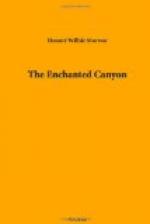Enoch smoked his cigar in silence for some moments before he said, with a chuckle:
“I like a fight, if only it’s in the open.”
“So do I!” exclaimed the President.
The conversation was desultory until the door opened, admitting the Secretary of State. He gave Enoch a glance and greeted the chief executive, then bowed formally to Enoch, and stood waiting.
“Sit down, Fowler! Try one of those cigars! They haven’t killed Huntingdon yet.”
“I beg your pardon, Mr. President,” stiffly, “it is quite impossible for me to make any pretense of friendship for the present Secretary of the Interior.”
The President raised his eyebrows. “What’s the trouble, Fowler?”
“You may have heard,” Fowler’s voice was sardonic, “that your Secretary of the Interior swung around the circle on a speech-making trip this fall!”
“I heard of it,” replied the chief executive, “probably before you did, because I asked Mr. Huntingdon to make the trip.”
“And may I ask, Mr. President, why you asked this gentleman to interfere with my prerogatives?”
“Come! Come, Fowler! You are too clever a man to attempt the hoity-toity manner with me! You undoubtedly read all of Huntingdon’s speeches with care, and you observed that his entire plea was for the states to allow the Federal Government to proceed in its normal function of developing the water power and oil resources of this country; that a few American business men should not be permitted to hog the water power of the state for private gain, nor to embroil us in war with Mexico because of private oil holdings there. You will recall that whatever information he used, he procured himself and, before using, laid it in your hands. You laughed at it. You will recall that I asked you, a month before Huntingdon went out, if you would not swing round the circle, and you begged to be excused.”
Still standing, the Secretary of State bowed and said, “Mr. Huntingdon has too distinguished an advocate to permit me to argue the matter here.”
Enoch spoke suddenly. “Although I’m grateful to the President, Mr. Fowler, I need no advocate. What in thunder are you angry about? If you and I are to quarrel, why not let me know the casus belli!”
“I’ve stated my grievance,” said Fowler flatly.
“Your new attitude toward me has nothing to do, I suppose,” suggested Enoch, lighting a fresh cigar, “with the fact that you dined with Hancock Brown the other evening?”
Fowler tapped his foot softly on the rug, but did not reply. Enoch went on. “I don’t want to quarrel with you, Fowler. I’m a sincere admirer of yours. But I’m going to tell you frankly, that I don’t like Brown and that Brown must keep his tongue off of me. And I’m deeply disappointed in you. You did not need Brown to add to your prestige in America.”
“I don’t know what the idea is, Fowler,” said the President suddenly, “but I do know that the aplomb and finesse with which you conduct your official business are entirely lacking in this affair. It looks to me as if you had a personal grievance here. Come, Fowler, old man, you are too brilliant, too valuable—”




